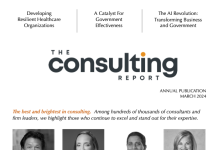For the past several years, technology consulting firms have been focused on helping their clients achieve technological transformation goals such as migrating infrastructure to the cloud and integrating ERP into existing systems. Business goals have shifted over time, and outside expertise is increasingly utilized to achieve specific business outcomes. Consultancies previously engaged in technical assignments are having to pivot to work focused on change management and business process design, and the Big Four firms are once again adapting to the new needs.
EY has identified a need for strengthened change management and increased people focus when tackling transformation efforts. With 85% of firms having been involved in two or more major transformations over the past five years, but with 67% reporting at least one failed transformation, there is a pressing need to place people at the center of change. Building the ability to adapt to and manage change into transformation efforts will boost the rate of acceptance and increase the probability of success.
KMPG maintains that clients are still looking for technical implementation, but their efforts now fit into a larger strategy that integrates change management into the process. The firm has launched a new products business focused on building a portfolio of tools to help clients better utilize their data, streamline processes, and boost operational efficiencies.
Deloitte suggests that the current generation of consulting offerings goes beyond business model and change management into leveraging ERP and RPA (robotics process automation) to accelerate the delivery of improved and more accurate services. Its AIOPS.D service, launched in March 2022, helps clients deploy AI-based applications that can autonomously execute core processes against critical business functions, making real-time, data-driven decisions.
Ultimately, consultancies are finding themselves in a unique position: the next iteration of consulting services will continue to add value by speeding tech implementation, but data will take a front seat to streamlining processes and managing change. A focus on value in decision making will reduce the customization of ERP systems, and placing the human element at the core of decision making will help ensure widespread adoption and speed transformation efforts. With studies consistently showing that only between 10% and 30% of transformation efforts succeed, global consultancies will be able to provide both knowledge and expertise while delivering innovation at scale, ensuring they will be able to meet the business needs of today — and tomorrow.

























